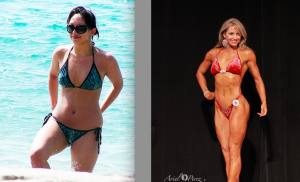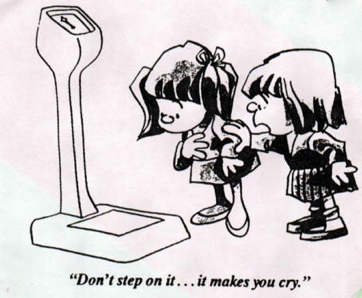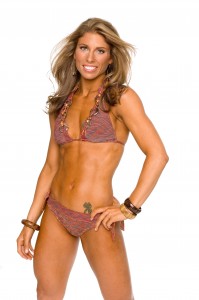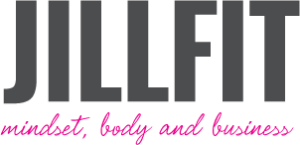“I know I shouldn’t get hung up on the numbers, but……” <— I hear this all the time from women–it’s like one on hand we believe that our weight is not the end-all-be-all of health and fitness, but we simply cannot stand the idea of not looking. Most women weigh themselves daily–and their whole day is dictated by “the number.” I’ll give you a number: ONE [the amount of times you should weigh yourself annually/at the doctors office], or how about TWENTY [the body fat % that separates the ultra-fit from the healthy], or even SIX [the dress size that the average healthy, fit 5’5″ woman wears]. Now these are numbers I can get on board with :)
Here are my 6 reasons why your weight (in lbs, kg, tons, whatever) really means very little in the grand scheme of health, fitness & fat loss:
1) Muscle.
You have heard this before, and yet, you still don’t like it or want to get on board with it: muscle is more DENSE than fat and takes up LESS SPACE. The more muscle you have on your frame, the heavier your weight will be, but the tighter and smaller your physique will be compared to someone who might weigh less but also has less muscle or a higher body fat %. The leanest I have EVER been is 12% BF and I still weighed 145 lbs, here:
I stay between 155 and 160 lbs year round at 5’7″. “But Jill, it’s because you have so much muscle!!” And yes, I agree, which is the exact point I am making :) And hence, I learned not to worry about the scale a very long time ago. If I was still hung up on the number on the scale, I would certainly be miserable.
2) Water weight.
You can literally gain up to 5-7 lbs within the same day. It’s simple. When you wake up in the morning, you are relatively dehydrated and in a fasted state, and then you hydrate throughout the day and eat food. Understanding this can help prevent melt-downs for people who weigh themselves multiple times a day.
Also, having a super-salty meal one evening can lead to excessive water retention the next morning. You can literally feel that you are holding water based on fluctuations in rings (tighter or looser) or joint swelling or looking at your midsection if you are fairly lean. This does not mean you are destined to keep that weight on…you rehydrate with 3-4L plain water, get back on your clean nutrition plan, eat lots of fibrous veggies and you can shed that retention within a single day.
3) Your weight is not an accurate reflection of how you look in clothes or on stage.
Once again, coming back to that muscle versus fat argument, your body fat % dictates what dress size you wear, though two people can wear the exact same size and look completely different. For example:
 Cheryl Burke (from Dancing with the Stars, left) and JillFit Coach Jillian Teta (figure competitor, right)
Cheryl Burke (from Dancing with the Stars, left) and JillFit Coach Jillian Teta (figure competitor, right)
Both are a size 4, yet look completely different because they have drastically different body compositions (or muscle-to-fat ratios). (Side note, Cheryl looks like she is on vacay, so we should give the girl a break (margaritas anyone?), which can lead to drastic water retention in a matter of only a day or two). Likewise, two women can weigh the exact same (one at 20% BF and one at 40% BF) and look drastically different. Thus, using your dress size and how your clothes fit are both much more applicable indicators of your health, fitness & fat loss than your weight in pounds–far and away.
4) Your weight is not always an accurate measure of health.
Ever hear of “skinny fat?” This is someone who tends to have a higher metabolism, stays thin, but might be flabbier with a high body fat percentage. They often have sarcopenic obesity, meaning they are in the “normal weight” range for their height, but their body fat % classifies them as “obese” while also putting them at a higher risk for chronic diseases such as diabetes, hypertension, cardiovascular disease and even cancer, not to mention the #1 most likely: osteoporosis. It is much healthier to be a little heavier in weight but with a lower body fat % than the opposite.
Unfortunately many insurance companies use weight and/or Body Mass Index (BMI, which is a height-to-weight measurement and essentially holds the same comparably inaccurate value to that of weight alone) to set their rates, which sucks for the people who weigh more because of their muscle mass. In fact, I am considered “overweight” in BMI terms :) So instead, use your body fat % or waist circumference as a more accurate measure of health.
5) Your ego.
Let’s face it, you get an ego boost when you weigh yourself and get a lower number. Not that there’s really anything wrong with that, EXCEPT how do you respond when the number goes UP? Often for people who are chronic-weighers, “the number” dictates how well their day will go: “Is it up? Is it down? This is going to be a bad/good day!” Having an attachment to your weight number is a double-edged sword. When it’s down, you’re up and when it’s up, you’re down. Having to rely on a quantifiable digit to decide my happiness is not a healthy place to be, no pun intended.
6) Playing with your self-worth.
I have worked with many women who have put way too much stock in their weight, their body fat % and dress size. Yes, the latter two can be a great indicator of health, but none of them should dictate your self-worth. Like Jillian says, “Your self-worth is inherent. No one can take it from you” and that includes a number on a scale. The problem with using any sort of objective measurement is that many times it can get entangled with our sense of self. We like to use all-or-nothing/black-and-white language when it comes to our weight: If we are losing weight, we are good. If we are gaining weight, we are a failure.
So instead, a better idea would be to decide RIGHT NOW that no matter what any of your numbers are (weight, BF%, circumference, dress size, salary :)), you are amazing. You are worthy, special and a success right now, in this moment:
“No one can make you feel inferior without your consent.” –Eleanor Roosevelt
(I think we can apply this to our scale as well!)




